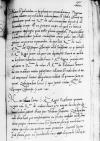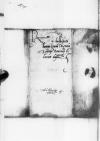Negotium duarum villarum cum molendino redimendarum et scholae Culmensi applicandarum, quod Vestra Reverendissima Dominatio mihi commendare dignata est, obviis manibus excepi et ex sententia confeci id, quod ex litteris in eo negotio conscriptis, quas mitto, plenius cognoscet. Deputari solent in huiuscemodi rebus iudices commissarii, coram quibus iura et obligationes ac pecuniae reponuntur. De quo licet Reverendissima Dominatio Vestra et reverendissimus dominus Tiedemann Giese (Tidemannus Gisius) (*1480 – †1550), in 1519 ennobled by King Sigismund I; 1504-1538 Canon of Ermland (Warmia); 1516-1527, 1533-1537 Judicial Vicar and Vicar General of Ermland; 1523-1538 Custos of Ermland; 1537-1549 Bishop of Kulm (Chełmno); 1549-1550 Bishop of Ermland (BORAWSKA 1984, passim)⌊episcopus CulmensisTiedemann Giese (Tidemannus Gisius) (*1480 – †1550), in 1519 ennobled by King Sigismund I; 1504-1538 Canon of Ermland (Warmia); 1516-1527, 1533-1537 Judicial Vicar and Vicar General of Ermland; 1523-1538 Custos of Ermland; 1537-1549 Bishop of Kulm (Chełmno); 1549-1550 Bishop of Ermland (BORAWSKA 1984, passim)⌋ nihil scripserint, eo quod fortasse
s(acra) or s(erenissima)⌈s(acra)s(acra) or s(erenissima)⌉
Sigismund I Jagiellon (Zygmunt I) (*1467 – †1548), King of Poland and Grand Duke of Lithuania (1506-1548); Duke of Głogów (Glogau) (1499-1506), Duke of Opava (1501-1506), Governor of Silesia (1504-1506); son of King Kazimierz IV Jagiellon and Elisabeth of Austria⌊maiestas regia seniorSigismund I Jagiellon (Zygmunt I) (*1467 – †1548), King of Poland and Grand Duke of Lithuania (1506-1548); Duke of Głogów (Glogau) (1499-1506), Duke of Opava (1501-1506), Governor of Silesia (1504-1506); son of King Kazimierz IV Jagiellon and Elisabeth of Austria⌋ aliquos iam deputasset, tamen ne quid in me desiderari videretur, cf. Sigismund II Augustus Jagiellon to Ioannes DANTISCUS & Stanisław KOSTKA Vilnius, 1546-11-07, CIDTC IDL 3009⌊mittocf. Sigismund II Augustus Jagiellon to Ioannes DANTISCUS & Stanisław KOSTKA Vilnius, 1546-11-07, CIDTC IDL 3009⌋ huius
s(acrae) or s(erenissimae)⌈s(acrae)s(acrae) or s(erenissimae)⌉
Sigismund II Augustus Jagiellon (Zygmunt II August) (*1520 – †1572), 1529-1572 Grand Duke of Lithuania (ruled from 1544); 1530-1572 King of Poland (crowned vivente rege (ruled from 1548, after the death of his father); son of Sigismund I Jagiellon and Bona Sforza⌊maiestatis regiae iuniorisSigismund II Augustus Jagiellon (Zygmunt II August) (*1520 – †1572), 1529-1572 Grand Duke of Lithuania (ruled from 1544); 1530-1572 King of Poland (crowned vivente rege (ruled from 1548, after the death of his father); son of Sigismund I Jagiellon and Bona Sforza⌋ commissionem in Reverendissimam Dominationem Vestram et magnificum dominum Stanisław Kostka (*1487 – †1555), as a leader of the so-called nobles' party active in Royal Prussia since 1536, Kostka stood in opposition to most of the members of the Council of Royal Prussia, who wanted to maintain the autonomy of the province and a "balance of power" in terms of governance. The tension between the Prussian Subtreasurer and the Council had been increasing since the Diet in Graudenz (Grudziądz) in 1533. Kostka, connected with the royal court since his youth, was sent to Graudenz as the King's deputy and, contrary to custom, decided to take part in the proceedings. In response to such a step, the Council members stopped the meeting. Kostka accused them of hostility towards the Poles and intervened on this matter at the court. In the absence of the then Bishop of Ermland (Mauritius Ferber) it was Dantiscus who chaired the Graudenz Diet. The incident badly harmed his future relationships with Kostka; 1531-1555 Treasurer of the Prussian lands and Treasurer of Marienburg (Malbork); 1544-1545 Castellan of Elbing (Elbląg), 1545-1546 Castellan of Kulm (Chełmno); 1546-1549 Vice-Voivode of Kulm; 1546-1551 Voivode of Pomerania; 1551-1555 Voivode of Kulm (PSB 14, p. 356; Urzędnicy 5/2, p. 216; MAŁŁEK 1976, p. 119-123)⌊palatinum PomeraniaeStanisław Kostka (*1487 – †1555), as a leader of the so-called nobles' party active in Royal Prussia since 1536, Kostka stood in opposition to most of the members of the Council of Royal Prussia, who wanted to maintain the autonomy of the province and a "balance of power" in terms of governance. The tension between the Prussian Subtreasurer and the Council had been increasing since the Diet in Graudenz (Grudziądz) in 1533. Kostka, connected with the royal court since his youth, was sent to Graudenz as the King's deputy and, contrary to custom, decided to take part in the proceedings. In response to such a step, the Council members stopped the meeting. Kostka accused them of hostility towards the Poles and intervened on this matter at the court. In the absence of the then Bishop of Ermland (Mauritius Ferber) it was Dantiscus who chaired the Graudenz Diet. The incident badly harmed his future relationships with Kostka; 1531-1555 Treasurer of the Prussian lands and Treasurer of Marienburg (Malbork); 1544-1545 Castellan of Elbing (Elbląg), 1545-1546 Castellan of Kulm (Chełmno); 1546-1549 Vice-Voivode of Kulm; 1546-1551 Voivode of Pomerania; 1551-1555 Voivode of Kulm (PSB 14, p. 356; Urzędnicy 5/2, p. 216; MAŁŁEK 1976, p. 119-123)⌋ cum mandato contra possessores villarum et molendini, ut vocati compareant, litteras obligatorias reddant et pecuniam suam recipiant. Quibus quidem cf. Sigismund II Augustus Jagiellon to Ioannes DANTISCUS & Stanisław KOSTKA Vilnius, 1546-11-07, CIDTC IDL 3009⌊litteriscf. Sigismund II Augustus Jagiellon to Ioannes DANTISCUS & Stanisław KOSTKA Vilnius, 1546-11-07, CIDTC IDL 3009⌋, si opus fuerit, utatur reverendissimus dominus Tiedemann Giese (Tidemannus Gisius) (*1480 – †1550), in 1519 ennobled by King Sigismund I; 1504-1538 Canon of Ermland (Warmia); 1516-1527, 1533-1537 Judicial Vicar and Vicar General of Ermland; 1523-1538 Custos of Ermland; 1537-1549 Bishop of Kulm (Chełmno); 1549-1550 Bishop of Ermland (BORAWSKA 1984, passim)⌊episcopus CulmensisTiedemann Giese (Tidemannus Gisius) (*1480 – †1550), in 1519 ennobled by King Sigismund I; 1504-1538 Canon of Ermland (Warmia); 1516-1527, 1533-1537 Judicial Vicar and Vicar General of Ermland; 1523-1538 Custos of Ermland; 1537-1549 Bishop of Kulm (Chełmno); 1549-1550 Bishop of Ermland (BORAWSKA 1984, passim)⌋, si non, non.
Mitto etiam litteras
s(acrae) or s(erenissimae)⌈s(acrae)s(acrae) or s(erenissimae)⌉
Sigismund II Augustus Jagiellon (Zygmunt II August) (*1520 – †1572), 1529-1572 Grand Duke of Lithuania (ruled from 1544); 1530-1572 King of Poland (crowned vivente rege (ruled from 1548, after the death of his father); son of Sigismund I Jagiellon and Bona Sforza⌊maiestatis regiaeSigismund II Augustus Jagiellon (Zygmunt II August) (*1520 – †1572), 1529-1572 Grand Duke of Lithuania (ruled from 1544); 1530-1572 King of Poland (crowned vivente rege (ruled from 1548, after the death of his father); son of Sigismund I Jagiellon and Bona Sforza⌋ Ruthenas, quarum vigore Vestra Reverendissima Dominatio centum boves ex Magno Ducatu isto Lituaniae habere poterit, etiam sine thelonei solutione. Quod quidem nulli alteri licet per constitutiones ex senatus consulto arctissime editas propter omnium rerum hic summam planeque inauditam caristiam, qua istis iam quattuor annis premimur. Mihi adscribed⌈hihi adscribed⌉ certe septingenti floreni, quos ex sacerdotiolis meis vix aliquando habeo in  BK, 230, p. 198 singulos annos, nequaquam sufficere possunt.
BK, 230, p. 198 singulos annos, nequaquam sufficere possunt.
Si quid aliud est, quod me facere sua causa volet, iubeat, velim, et factum putet. Mihi equidem semper volupe erit, sicubi illi gratificari et inservire potuero apud hunc Sigismund II Augustus Jagiellon (Zygmunt II August) (*1520 – †1572), 1529-1572 Grand Duke of Lithuania (ruled from 1544); 1530-1572 King of Poland (crowned vivente rege (ruled from 1548, after the death of his father); son of Sigismund I Jagiellon and Bona Sforza⌊principemSigismund II Augustus Jagiellon (Zygmunt II August) (*1520 – †1572), 1529-1572 Grand Duke of Lithuania (ruled from 1544); 1530-1572 King of Poland (crowned vivente rege (ruled from 1548, after the death of his father); son of Sigismund I Jagiellon and Bona Sforza⌋, quem sibi Vestra Reverendissima Dominatio sciat esse affectum. Et ego nihil praetermitto, quod ad officium boni servitoris pertineret.
Pro panno rubeo plurimas ago gratias. A reverendissimo domino Tiedemann Giese (Tidemannus Gisius) (*1480 – †1550), in 1519 ennobled by King Sigismund I; 1504-1538 Canon of Ermland (Warmia); 1516-1527, 1533-1537 Judicial Vicar and Vicar General of Ermland; 1523-1538 Custos of Ermland; 1537-1549 Bishop of Kulm (Chełmno); 1549-1550 Bishop of Ermland (BORAWSKA 1984, passim)⌊episcopo CulmensiTiedemann Giese (Tidemannus Gisius) (*1480 – †1550), in 1519 ennobled by King Sigismund I; 1504-1538 Canon of Ermland (Warmia); 1516-1527, 1533-1537 Judicial Vicar and Vicar General of Ermland; 1523-1538 Custos of Ermland; 1537-1549 Bishop of Kulm (Chełmno); 1549-1550 Bishop of Ermland (BORAWSKA 1984, passim)⌋ pro litteris consensus regii nihil exigo Vestrae Reverendissimae Dominationis causa.
Quod Vilnius (Wilno, Vilna), city in Lithuania, on the Vilnia river, capital of the Grand Duchy of Lithuania⌊hincVilnius (Wilno, Vilna), city in Lithuania, on the Vilnia river, capital of the Grand Duchy of Lithuania⌋ scribam novi, praeter huius
s(acrae) or s(erenissimae)⌈s(acrae)s(acrae) or s(erenissimae)⌉
Sigismund II Augustus Jagiellon (Zygmunt II August) (*1520 – †1572), 1529-1572 Grand Duke of Lithuania (ruled from 1544); 1530-1572 King of Poland (crowned vivente rege (ruled from 1548, after the death of his father); son of Sigismund I Jagiellon and Bona Sforza⌊maiestatis regiaeSigismund II Augustus Jagiellon (Zygmunt II August) (*1520 – †1572), 1529-1572 Grand Duke of Lithuania (ruled from 1544); 1530-1572 King of Poland (crowned vivente rege (ruled from 1548, after the death of his father); son of Sigismund I Jagiellon and Bona Sforza⌋ optimam valetudinem, nihil habeo. Si quid erit, scribam per aliam occasionem.
Interim me gratiae Vestrae Reverendissimae Dominationis unice commendo.
 BK, 230, p. 198 singulos annos, nequaquam sufficere possunt.
BK, 230, p. 198 singulos annos, nequaquam sufficere possunt.

